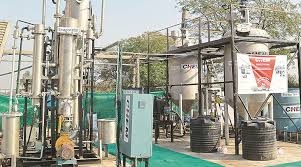
For every litre of alcohol they produce from fermentation of sugarcane molasses, distilleries generate 10-15 litres of wastewater effluent or “spent-wash”. The 300-odd molasses-based distilleries in India churning out 2.5-2.6 billion litres of alcohol annually, thus, also discharge 30-35 billion litres of this hazardous residual liquid, which, if disposed untreated, can contaminate surface and ground water.
The Central Salt & Marine Chemicals Research Institute (CSMCRI) here has developed a process to separate the main source of pollution — potash and biodegradable organic matter — from distillery spent-wash. This technology, it is claimed, will not only help distilleries comply with the Central Pollution Control Board’s mandated zero liquid discharge (ZLD) action plans, but also meet up to a tenth of India’s potassium-based fertiliser requirements, now entirely met through imports.
Distilleries in India currently manage their spent-wash mainly by converting it into manure by mixing the wastewater with press-mud, a residue from sugar mills.
Read more of this break-through in a report by Gopal Kateshiya published in The Indian Express....












